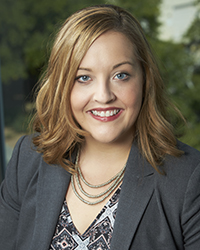Fighting for What’s ‘Write’
Professor Lori Johnson pushes for equity in academic standing for legal-skills colleagues

By Paul Szydelko
Professor Lori Johnson already has a mission for 2022, and it’s rather straightforward: Overcome the vestiges of a time when law schools undervalued the importance of legal writing.
The UNLV William S. Boyd School of Law associate professor will advocate for equity in status for legal-writing professors around the country next year when she chairs the Legal Writing, Reasoning and Research Section of the Association of American Law Schools (AALS).
“Legal writing wasn’t even taught at most law schools until around 30 to 40 years ago,” Johnson says. “It’s [now] ubiquitous that every school provides these courses, but there’s a long-standing bias that teaching legal writing isn’t quite as important as teaching a course focused on doctrine or theory.”
All too often law professors who teach these vital skills are not tenure-tracked—let alone tenured. As a result, they often have less job security, lower pay, less input about their campus obligations, and fewer voting rights than their colleagues.
While this inequity still exists at many schools, the UNLV Boyd School of Law transitioned professors in its Lawyering Process Program onto equal footing with their peers beginning in 2013. It’s one reason, Johnson believes, that the school has claimed the No. 1 spot for legal writing three years in a row in U.S. News & World Report’s Best Graduate School rankings.
Since UNLV Boyd Law implemented its policy to elevate the status of legal-writing professors, students see first-hand that developing writing and other lawyering skills is just as essential as learning about contracts, torts, civil procedure, and criminal law.
“Students begin to understand the value and importance of legal skills in addition to the legal doctrine that they’re learning,” Johnson says. “Without legal skills, there’s no way for students to put that doctrine into practice.”
Among other benefits, Johnson says professors who attain tenure can bring their skills to doctrinal classes, more readily develop interdisciplinary approaches to teaching, and devote more time to scholarship about legal writing and other topics.
Equity will be on the agenda when Johnson’s section teams with the AALS section on Professional Responsibility in January to cohost a virtual panel (with fellow UNLV Boyd professor Kathy Stanchi) titled “Pursuing the Common Good in Fractured Communities.” The section also recently hosted a well-attended webinar specifically focused on equity, titled “Ensuring Equality in Legal Academia: Strategies to Dismantle Caste.”
Johnson’s scholarship also reflects this combination of theory and skills. Last year, she authored “Navigating Technology Competence in Transactional Practice, which examines how lawyers must keep current with the latest innovations. However, Johnson notes that lawyers can’t lean too heavily on artificial intelligence, for example, or they risk underutilizing their own experience, judgment, and skills.
“It is still imperative that a lawyer be the final arbiter of what goes into their clients’ documents,” she says.
Johnson shares her passion for teaching and researching with the adjunct professors she trains to teach upper-level courses in the Lawyering Process Program. A Willow Tree sculpture of a woman holding a book—a thank-you gift from an adjunct professor she assisted—is displayed in Johnson’s office. Symbolic of her love for reading, the gift also reminds Johnson how she’s helped shape the UNLV Boyd School of Law during the past 11 years.
“One of the best things about this job is the ability to help others—not just my students, but also help my colleagues and others to fulfill their professional goals.”